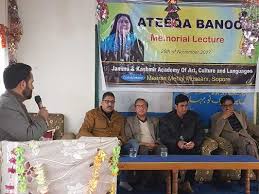Atiqa Bano paid tributes for contribution to redefine vernacular heritage
Traces of Sopore being a civilisation have been found, a noted heritage expert of Kashmir said Sunday.
Delivering Atiqa Bano memorial lecture to mark the heritage week, heritage expert and former Director General (DG) Tourism, Saleem Beg said in the north Kashmir’s apple-rich town of Sopore and adjoining areas, traces had been found that prove it was a 5000-year-old civilisation.
Beg said “this makes it imperative to explore it further with new dimensions.”
“This is important to know our past that is dotted with glorious traditions,” he said.
The lecture was organised by Jammu and Kashmir Academy of Art, Culture and Languages (JKAACL) at Kashmir College of Education for Women, founded by late Atiqa Banoo.
The function was presided over by the newly-elected president of Adbee Markaz Kamraz Jammu and Kashmir, Farooq Rafiabadi while senior journalist Shujaat Bukhari was the chief guest. Beg stated that a scholar, Mumtaz Yatoo, from Sopore had in his research found that wheat and millet were produced in Qasim Bagh, Bomai and Botengoo areas of Sopore some 5000 years back.
“He has done an intense research and the findings have been published in an international journal,” he said.
Beg said when it was found that traces of wheat production 5000-years-back had been found in Tajikistan, researchers rushed there to further the findings.
“However, Sopore has not been explored as yet,” he said.
Beg said “looking at all its dimensions and bringing it to the public would be a tribute to Late Atiqa Banoo.”
“Karewas have been our heritage wealth. Our specialty is because of this important feature,” he said. “Otherwise too, Sopore is rich as far as its political and cultural history is concerned.”
Recalling Atiqa Banoo’s contribution in redefining the heritage in Kashmir, Beg said, “Her work brought out a new facet of heritage to public domain.”
He said her tremendous work of conserving the vernacular heritage in the shape of Meeras Mahal was remarkable. “She kept this heritage alive which no one in the recent past had done,” he said.
Paying rich tributes to her Shujaat Bukhari said JKAACL has done its duty in organising the lecture in her memory that “too coinciding with the heritage week.”
“Society’s positives are reflected by illustrious people like Atiqa Ji who set a benchmark for community service,” he said adding that she also contributed immensely to AMK as its senior vice president.
Farooq Rafiabadi, who was elected the new president of AMK earlier in the day said, “Atiqa Ji was a personality with many dimensions, an educationist, a heritage lover and a language activist, and we will try our best to preserve the legacy she left behind.”
Earlier in his welcome address, JKAACL Secretary, Aziz Hajini said, “By creating Meeras Mehal, Atiqa Banoo made all of us indebted.”
He said there was no such concept in private sector and, until her death, and many people did not know about her great work. “She has become immortal now,” Hajini said. JKAACL Chief Editor, Muhammad Ashraf Tak conducted the proceedings.






